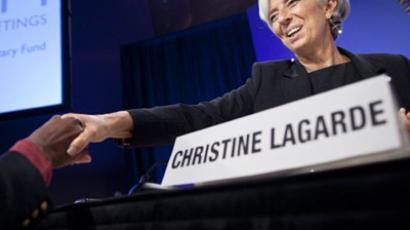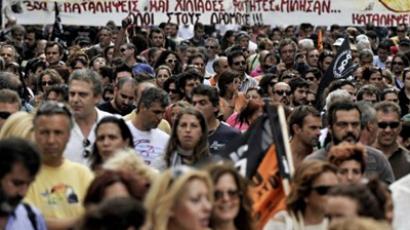‘Save the euro’ mission divides politicians and people
With Berlin now guaranteeing loans to Greece totaling 211 billion euros, the gap between what the population wants and what the politicians are doing has increased dramatically.
Ten out of 17 Eurozone countries have so far approved boosting the bailout fund. But the measure will not help in the long run, warns Robert Oulds, chair of the influential Bruges group in London.“The heart of the problem is the euro, and Greece’s membership in the euro, which is not helping their economy,” he said. “The way to address this is for Greece to leave the EU, recognize that default is inevitable, and devalue a new currency – reinvigorating their economy that way. They need to recognize the euro has failed for them.”Germany's lawmakers do not object to letting more bailout cash come from their country. But the German public does not want their money to be handed over to Greece, he says.“There is an increasing gulf between the political class and what the population is thinking,” said Oulds. “The political class is not facing the economic reality, they are just concerned with the political project of the euro when they should be concentrating on people’s jobs and protecting taxpayers’ money.”With Germany desperate to keep Greece in the euro, Chancellor Angela Merkel says if the euro collapses, then so will the whole European Union. But according to Oulds, the euro is hurting the single market because it is creating more divergence.“The European Union and the single market would be better off without the euro, where countries can set their own currencies’ value to suit their economic needs and requirements and manage their own economies as they see fit,” he stated.He also said the debt crisis encompasses many other nations, and Greece is just the first to be suffering the severe problems caused by the euro.“The problems are spreading to other countries, like Italy, and they are too big to be bailed out,” Oulds concluded. “What needs to be done is these countries need to leave the euro – it is the correct way forward.”
Economics professor Yohim Foth said that given what is happening in Greece at the moment, the euro might only last for six more months.“If you look at the bailout package the German Parliament passed, they are fighting yesterday’s battle,” he stated. “The problems today are much bigger and the rescue that Europe needs is much bigger that what the German Parliament approved today.”With Greece hiking taxes and passing more and more cuts, he said, austerity is clearly not working.“If you look at the level of unrest in Greece today, and the likely level of unrest in countries like Spain, where unemployment is 20 percent, you will see austerity is not working,” Foth warned. “The way forward is for Europeans to find a way to undo the mess that they did by introducing the euro in its current shape, putting together countries that do not belong together.”
Panagiotis Sotiris a sociology professor at the University of the Aegean in Athens, believes that the question the country faces is not if Greece will default, but how.“All the measures taken by this troika – by the European Union, [European Central Bank], IMF – lead one way or another to some sort of default, some sort of managed default,” he told RT. "But this default is going to be accompanied by ever harsher austerity measures, sort of social barbarism. We have to default on our own terms – which means an immediate stopage of payment of the debts, an immediate exit of Greece from the Eurozone, from the euro. And a radically different policy of nationalization of banks, capital controls and redistribution of income toward the lower [tax brackets]. There is no other way out of the situation, except to default on our own terms.”














